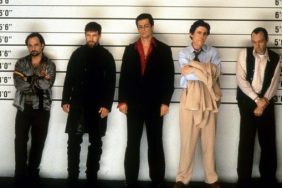The Cars movies have always been an odd member of the Pixar family. The series, about a world in which people are conspicuously absent and vehicles are sentient, is an amusing little play on the way people tend to project themselves into their technology, but to the consternation of movie fans everywhere, the films don’t always seem to run on any consistent, internal logic.
Among the questions that still plague Cars fans: Whatever happened to humanity? How old is the Cars universe? If there are no biological organisms, how can these cars run on fossil fuels? Who keeps making these new cars? The list goes on and on, and according to Brian Fee and Kevin Reher, the director and producer of Cars 3, all those questions are besides the point.
Also: ‘Cars 3’ Review | Kill the Headlights and Put It in Neutral
I spoke to Brian Fee and Kevin Reher about the logic of the Cars movies (or rather, the lack thereof), the new film’s journey into more mature dramatic territory. They also confirmed that, although the Cars movies and Planes movies are a part of Disney, they are completely separate entities and will never cross over.
Cars 3 opens in theaters everywhere this weekend.

Alberto E. Rodriguez/Getty Images for Disney
Crave: The Cars franchise is a big deal to a lot of kids, and yet it’s kind of an odd entity in the Pixar series of films. If you look at a lot of Pixar movies, they take place in a corner of the real world. “Here’s what bugs are doing when humans aren’t looking. Here’s what your toys are doing.” But the world of Cars doesn’t work that way. How DOES the world of Cars work? What is the underlying philosophy behind the world of Cars?
Brian Fee: The only really underlining philosophy is that it’s just a fantasy. It’s a metaphor. The vehicles, the characters, even the world itself, it’s just a metaphor for our world. I always think of the characters kind of like, if you think about dogs and people, people tend to own dogs that are like them. We think about the types of cars that people would drive. A lot of the time when we’re thinking about, when we have a character, what kind of car should it be? We think about who would it be as a person, and what would they drive? So to me it’s just a metaphor. You have to let go of the connection or else you can’t actually sit back and enjoy the story.
And I think some people do have trouble with it sometimes. There are certain logical rules that we want to try to connect. For example, in Cars 3, characters talk about “growing up.” Were they born? Do you think about these things at all? You have to create a consistent world, right?
Brian Fee: For us, it’s a threshold. It needs to be a world we’re familiar with, too, right? So if we held ourselves too literal, the world would not be something you would recognize, you know? So they have to talk in a way that you understand, in a way that you can follow the story without… so for us it’s just a threshold, when it comes to things like that. For instance, our characters don’t tend to have fathers and mothers, you know? But we do have aunts and uncles. We’ll use those terms. We’ll use “separated family” because it’s kind of like “inherited family”, almost. We want to tell a story. We don’t want to pull you out of that story. So when it comes to those types of things we just look at it as, what’s pulling me out of the story? Or what’s helping me go with the story?

Disney / Pixar
Have you ever felt like you were crossing the line? Like, you were introducing an element that raises too many questions?
Brian Fee: Well, we wouldn’t do it. [Laughs.]
Yeah, but I’m curious if you’ve ever come close to it, and if so, what that line might be.
Kevin Reher: You’ve got that moment where Sally and McQueen kiss, and we went, “Yeah, no.” No. Cars don’t kiss.
Brian Fee: Metal on metal, you know?
Kevin Reher: Metal? How is that possible?
Brian Free: It’s going to make a sound effect.
Kevin Reher: Right. No. Clanging.
Brian Fee: Our biggest goal is just to tell a story and we want… to me, the biggest compliment that I could get is if someone were to tell me, “I forgot that they were cars, and I was just watching characters.” Because that kind of is the goal. We have fun with the fact that they’re cars, right? But we’re trying to tell a story about characters.
Kevin Reher: I took the movie to NASCAR and this woman walked out and she had two daughters. “I love the movie for my daughters,” but she said, “I found myself emotionally connected and crying over a damned car!” and I’m like, “Yes!”
For this particular film?
Kevin Reher: For this movie, yeah.

Disney / Pixar
Well, I think this one’s kind of interesting because it works on two levels. On one hand it’s a story for little kids. It’s about talking cars. But it’s a story about retirement and reaching a retirement age. That’s a big disparity, in terms of the experience of the film. It’s a film for older people and really, really young people.
Brian Fee: Well, while kids aren’t going to understand or follow the cares of somebody who might be retiring, the same screening where we took the film to our NASCAR community, who helped us so much to make the film… we did an early screening for them and when the Sterling character told McQueen that he was not going to race anymore, there was a boy running up and down the aisle yelling, “No, no, no, no!” So kids understand THAT, right? Their beloved character can’t do the thing he wants to do. That they understand.
I’m curious, because on some level this is a sports movie, and in sports movies we often have a very clear set of stakes. The stakes here are interesting, because even if Lightning McQueen can’t race anymore he still has his legacy, and he still has someone who’s supporting him and saying “We are going to support you. We’ve got this museum. We’ve got this money.” What goes into that storytelling decision, the storytelling process? Do you not want to make it too intense for little kids? Do you not want to see him destitute?
Kevin Reher: We did crash him. [Laughs.]

Disney / Pixar
You DID crash him! That was messed up!
Kevin Reher: We had a kid write us, five years old, going “Are you killing Lightning McQueen?” and he said, “Because I want to know who did it, because I’m going to buy that toy and I’m going to kill him.”
Oh my god!
Kevin Reher: I know! And his mother said, “I just calmed him down after Trump, and now you’re going to kill Lightning McQueen?” So we sent a poster and a note and said no, we’re not killing Lightning. Just, that first teaser was so… I mean, we got tons of notes from people like, “Oh my god, this is a different… they’re crashing their hero!”
Brian Fee: We looked at it from… like Jeff Gordon, before he retired, we talked a lot to Jeff Gordon, and one of the things he told us before he even said he’s going to retire… but he was talking about the idea that he will have to retire eventually, and he was telling us that his biggest fear is that he’s never going to be as good at anything else. And you think, he’s in his early 40’s. He’s got half of his life in front of him. I think it’s scary for anyone to think, “I’m 40 years old and the best part of my life is behind me?” That’s sad, right? It’s sad to think it’s all downhill from here and there’s nothing to look forward to. And so we were looking at McQueen as, all he’s ever known is racing. That’s his passion. If he can’t get out there and do the thing that he loves… it’s not about winning, for him. When he’s talking with Sterling he’s pleading and pleading with Sterling to give him another chance, and he ends up making that bet with Sterling. He just wants to keep racing. Of course, the bet that he makes is that he has to win. In order to keep racing he’s got to win the next race, which is an impossible gamble. But he doesn’t think there’s anything else that will ever compare to racing.

Disney / Pixar
You have to deal with the possibility, the drama, of being cynical about this sport. You have a lot of young rookies who have no respect. You have a lot of people who are trying to monetize it as well. Can you tell me about that? This seems like such a hopeful series, and now… who’s even MAKING these cars, just to trump these old timers everyone loves, you know?
Kevin Reher: When we did our research Jeff Gordon talked about how he’ll know a new driver because a new driver, younger drivers, they’ll go fast and balls out, but they’ll hit the wall and crash more often. And he says, “As a mature racer, I know that I can’t go balls out because I’ve to get around that turn,” or do whatever. And a lot of the Jackson Storm of it, and not respecting the history of racing and things, a lot of that came out of our research.
Brian Free: To me it’s kind of a truth, right? Respecting your elders and respecting your history. Not every kid… some kids will surprise you, some kids are always into that, right? I think your average kid, that’s a maturity they haven’t found yet. So Jackson Storm and his generation isn’t old enough to respect the older generations the way McQueen [does]. I’m not sure I answered the question.
You’re okay, it was general. I just wanted you to talk about incorporating that element.
Kevin Reher: The other thing is, it is McQueen and Cruz’s story, and you don’t want to give too much weight to the whole backstory of Jackson Storm. I mean, I think one of the things that’s great about Armie Hammer is you get that this guy is a jerk. You get it right away. “Get a lot of pictures! This guy is a crafty veteran!” All that kind of stuff. All those sort of sarcasms. You get immediately, this is jerk.
Brian Fee: Well, it’s somebody who’s never had to work hard, right? Storm kind of represents somebody who was almost born into the system, so to speak, right? He’s never had to work hard, he doesn’t think anyone else belongs there but him. He doesn’t think McQueen’s generation belongs there anymore. He certainly doesn’t think Cruz, who’s a street car, could possibly be as fast as him and when it turns out she just might be, it grows a fear in him that he’s never had to deal with before.
What is the Pixar philosophy on the Planes movies? Are those canon or are those their own separate entity right now? How do you feel about them?
Kevin Reher: They’re their own separate entity. They’re done by a group at DTS and John [Lasseter] is involved at DTS, but we have no relationship to them at all.
So you don’t think there will ever be some sort of crossover?
Kevin Reher: No.
Brian Free: No.
That’s never going to happen?
Brian Free: No.
All 16 Best Animated Feature Oscar Winners: Ranked
William Bibbiani (everyone calls him ‘Bibbs’) is Crave’s film content editor and critic. You can hear him every week on The B-Movies Podcast and Canceled Too Soon, and watch him on the weekly YouTube series What the Flick. Follow his rantings on Twitter at @WilliamBibbiani.
All 16 Best Animated Feature Oscar Winners: Ranked
-
16. Happy Feet (2006)

Emperor penguins, as if you didn't know, profess their love through song. This leads to one annoying, self-satisfied pop number after another in Happy Feet, a well-intentioned but mostly grating film about a penguin who - gasp! - dances instead of sings. In the Academy's defense it was a weak year for the Best Animated Feature category: Happy Feet's only competitors were Cars and Monster House.
Photo: Warner Bros.
-
15. Shrek (2001)

The first-ever Best Animated Feature winner, Shrek was a popular blockbuster with a novel approach: bringing acerbic wit and pop culture references to old school fairy tales. The film is still funny but the novelty has worn off, leaving behind it just a decent comedy with a fair amount of heart.
Photo: Dreamworks Pictures
-
14. Brave (2012)

Critics and audiences were perplexed by Brave, a Pixar film that appeared to be about a warrior princess kicking butt, but was instead about a princess whose mother turns into a bear, leading to wacky hijinks. But it's a GOOD film about a princess whose mother turns into a bear, leading to wacky hijinks, and the emotional storyline between the two heroines is genuinely potent. Brave may be a weird film, but it's not a bad one.
Photo: Disney/Pixar
-
13. Big Hero 6 (2014)

Disney's first animated Marvel superhero movie won the prize for Best Animated Feature, and it's easy to see why. Big Hero 6 is an imaginative and energetic film about super-scientists fighting each other, but at its heart it's also a touching story about a young boy coping with loss. His new friend Baymax, an indelible creation to be sure, is the ultimate enabler, which leads to happiness and depression in equal measure for our hero, Hiro. If the film's main plot didn't seem written by the numbers, it might have placed a lot higher on this list.
Photo: Disney
-
12. Wallace & Gromit in The Curse of the Were-Rabbit (2005)

The beloved stop-motion heroes Wallace and Gromit had already earned two Oscars for Best Animated Short before their punny, funny feature film The Curse of the Were-Rabbit took home the Academy Award. The film is an amusing adventure in which the inventor and his hapless dog run afoul of a rabbit monster, but it doesn't have as much of an emotional impact as many of the other Best Animated Feature winners.
Photo: Aardman Animations
-
11. The Incredibles (2004)

Brad Bird's ode to suburban families and superheroes may catch some flack for its Ayn Rand inspired theme - i.e. that some people really are more special than others - but it's a relentlessly inventive motion picture with unforgettable fight scenes and a whole lot of heart. The Incredibles really is incredible.
Photo: Disney/Pixar
-
10. Ratatouille (2007)

Brad Bird's second Pixar feature has a bizarre concept - a rat who controls an amateur chef like a puppet in order to work at a world class restaurant - but it's also an inspired motion picture. Passionate, funny and beautifully animated - with a finale that smartly explores the often difficult relationship between artists and critics - Ratatouille is an undeniably odd, but excellent feature.
Photo: Disney/Pixar
-
9. Zootopia (2016)

Disney ambitious anthropomorphic animal buddy cop movie is funny the first time you see it, but works better as a serious drama about social and racial divides every time you revisit it. The jokes are hit or miss, but the cultural commentary is consistently hard-hitting.
Photo: Disney
-
8. Rango (2011)

Twisted and hilarious, Rango transforms the story of a chameleon who becomes a wild west hero into a thoughtful examination of malleable nature of identity itself. As the title character, Johnny Depp turns in a great performance as a creature who has no idea who he is, and has to make up his whole persona as he goes along. Thanks to Gore Verbinski's eccentric direction, that unusual character arc is a genuine treat, full of surreal moments and incredible action.
Photo: Paramount Pictures
-
7. Frozen (2013)

Disney's blockbuster musical has it all: intriguing characters, unexpected twists, memorable songs, a great sense of humor and a message about outsider psychology that everyone can relate to. Yes, "Let It Go" got overplayed. A lot. But let that go and you'll find that Frozen really is a modern classic.
Photo: Disney
-
6. Up (2009)

Pixar's most emotionally devastating movie also has its strangest plot line. Up is the story of an old man whose wife dies, leaving him alone with his regrets. So he attaches so many balloons to his house that it floats away to an exotic locale filled with endangered giant birds, talking dogs and mad explorers bent on destroying him. But somehow it all works. Up will make you cry harder than practically any film, but it will also make you laugh, cheer and marvel at its ingenuity.
Photo: Disney/Pixar
-
5. Inside Out (2015)

Inside Out imagines a world inside the human mind, where our emotions and impulses take on their own forms and struggle to keep the larger organism happy. It's a rich and intricate concept that Inside Out illustrates beautifully, making an otherwise simple story feel as epic as it feels to the young, troubled protagonist whose head is home to all the other great characters.
Photo: Disney/Pixar
-
4. Finding Nemo (2003)

A road trip movie without that pesky ol' road, Finding Nemo is a damn near perfect film about an overprotective father who travels the vast expanse of the ocean to track down his only child, who was kidnapped by a well-meaning dentist. Unique characters and a pulse-pounding race against time elevate what could have been a standard family flick to classic status, full of eye-popping visuals and truly powerful scenes.
Photo: Disney/Pixar
-
3. Toy Story 3 (2010)

The darkest film in the Toy Story saga is also the best, as the beloved action playthings wind up unwanted and unloved after their owner grows up. Toy Story 3 combines terrifying imagery of these heartwarming characters accepting their own unthinkable death with whimsical interludes involving the dream life of Barbie and a Mexican lothario version of Buzz Lightyear, and gets away with every single moment of it. It's one of the most important artistic achievements in Pixar's already significant history.
Photo: Disney/Pixar
-
2. WALL-E (2008)

Experimental, courageous and astoundingly meaningful, Pixar's sci-fi classic WALL-E stars a trash compacting robot who discovers the meaning of love and winds up saving the lethargic, apathetic human race from themselves. The ambition of WALL-E, from the initial and almost entirely silent first act to the film's troubling notions about the nature of the corporate machine (not unlike the one that was responsible for this film, ironically), are breathtakingly realized in what will probably go down as of the better sci-fi films ever made.
Photo: Disney/Pixar
-
1. Spirited Away (2001)

Hayao Miyazaki, arguably the greatest living filmmaker, won his only Academy Award for Spirited Away, and the Best Animated Feature award has never been more deservedly given. Spirited Away may very well go down as Miyazaki's finest work. It's a masterpiece of unlikely storytelling, about a young girl forced into servitude after her parents are turned into pigs. But by accepting the responsibilities we ordinarily from which we ordinarily protect our children, she grows up. The strange and beautiful world of Spirited Away is unlike practically anything else you will ever see, and Miyazaki directs it with his usual, masterful sense of wonderment.
Photo: Studio Ghibli








